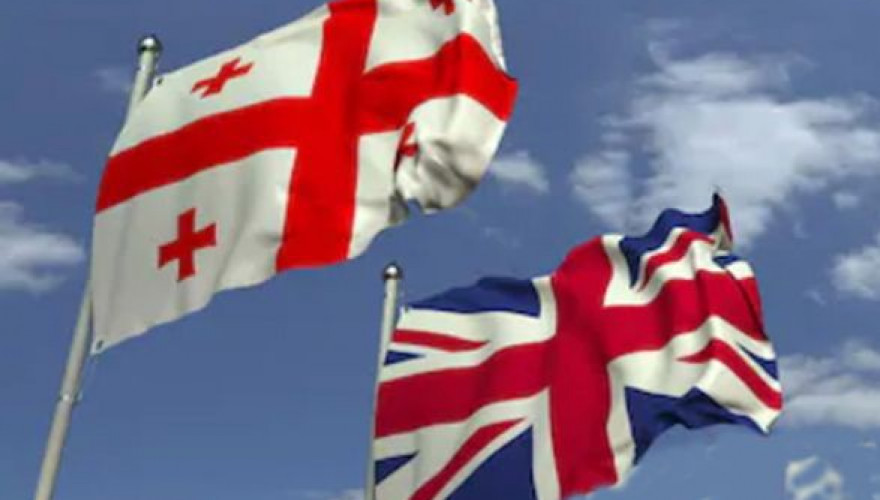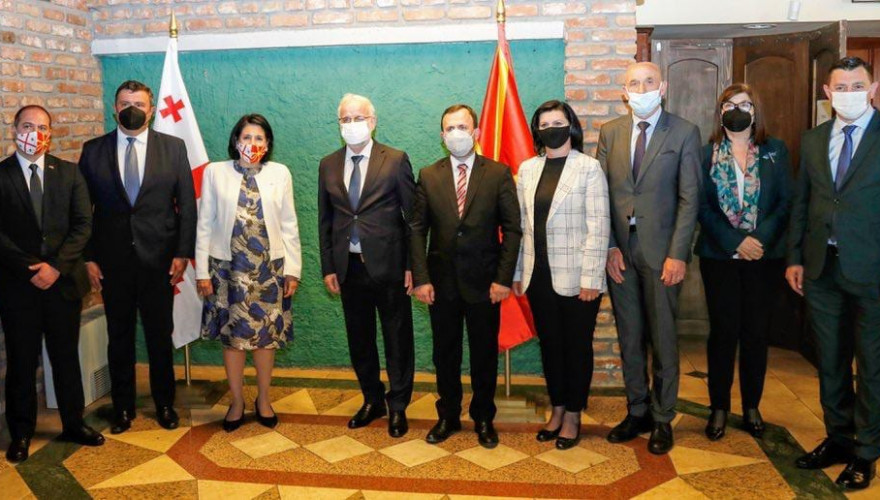Georgian-UK Friendship Group and Inter-Party Parliamentary Group on Georgian Issues Develops Joint Communiqué

Vice-Speaker Kakhaber Kutchava held an online meeting with the members of the British Parliament, the Ambassador Extraordinary and Plenipotentiary of the United Kingdom to Georgia, Mark Clayton, and the Ambassador Extraordinary and Plenipotentiary of Georgia to the United Kingdom, Sophio Katsarava, in the parliamentary format of the Wardrop Strategic Dialogue.
The meeting was also attended by the Chairman of the Foreign Relations Committee, Irakli Beraia, and members of the Friendship Group with the Parliament of the United Kingdom of Great Britain and Northern Ireland, MPs Mariam Jashi and Giorgi Tugushi.
Members of the Georgian-UK Parliamentary Friendship Group and the Inter-Party Parliamentary Group in the Parliament of the United Kingdom of Great Britain and Northern Ireland developed a joint communiqué at the meeting.
Both sides positively assessed the Georgian-British strategic partnership, which bears on common values and interests, as well as the challenges that either country encounters.
During the meeting, the parties discussed a wide range of issues, including the role of the British Parliament in ongoing processes. Talks focused on global security challenges, Britain's role after leaving the EU, and the country's involvement in EU security.
The Georgian side briefed the British counterparts on the democratic reforms being implemented in Georgia, including constitutional changes to the electoral system and electoral reform in general.
The Georgian side noted the statement made by the European Union that the adoption of constitutional amendments in the run-up to the elections is a key moment to promote more political pluralism in the country, as well as the statement by the US State Department that the adoption of constitutional amendments contribute to more stability and ensure the parliamentary pluralism in the October elections.
The British side highly estimated Georgia's progress in pursuing an active reform agenda and on the path to EU and NATO integration, and hailed the electoral reform as an important step towards stronger democracy and greater political pluralism.
In this regard, the British side stressed the importance of holding open, fair and transparent parliamentary elections on 31 October 2020.
The participants of the meeting reviewed the grave security, humanitarian and human rights situation in the Russian-occupied regions of Abkhazia and Tskhinvali.
They were particularly concerned about the growing provocations and aggressive actions by Russia during the new Coronavirus (COVID-19) pandemic, including the laying of barbed wire and artificial barriers along the occupation line, illegal detentions and the kidnapping of local residents, as well as the shooting of Georgian citizens.
The parties emphasized that the restriction on freedom of movement, i.e. prolonged closure of checkpoints, protracted ethnic discrimination, violation of the right to education in the mother tongue, and refusal of health care and medical evacuation significantly aggravate the humanitarian conditions of the conflict-affected population.
The Georgian and British sides have condemned Russia's intensive hybrid warfare, the cyber-attack on the IDP system, as well as disinformation campaigns against the Lugar Public Health Research Center, which plays a crucial role in coping with the pandemic.
The delegations aired their concern over Russia's non-compliance with the terms of the ceasefire agreement reached with involvement of the EU on 12 August 2008, noting that continued occupation of Georgian territories, steps towards their annexation, and intensive militarization of Georgia's sovereign regions poses a significant threat to European security and undermines an international system based on rules.
Both sides stressed the importance of introducing international security and human rights mechanisms on the ground and allowing the EUMM to deploy its mandate throughout Georgia.
The parties reaffirmed their support for a peaceful solution to the conflict, which should be based on respect for Georgia's sovereignty, territorial integrity and the inviolability of internationally recognized borders. The importance of achieving tangible results in the format of Geneva International Discussions through non-use of force, international security mechanisms and the return of internally displaced persons and refugees was emphasized.
In addition, the parties expressed support for the Georgian Government's initiative "A Step Towards a Better Future", which focuses on improving the humanitarian, social and economic conditions of the conflict-affected population and building relationships between the divided communities.
The Georgian and British sides called on the Russian Federation to fulfill the August 12, 2008 Ceasefire Agreement, withdraw its troops from the territory of Georgia, withdraw the so-called recognition of the independence of the occupied territories of Georgia and ensure the safe and dignified return of IDPs and refugees to their homes.
The parties paid special attention to important issues related to the agenda of Georgia's NATO integration and hailed the dynamic and enhanced NATO-Georgia cooperation.
In this context, the parties emphasized the conduct of the multinational exercise "Decent Partner 2020" in Georgia on September 7-18, 2020. The British side hails the progress made by the aspirant Georgia on the path to NATO integration, including the implementation of the decision made at the Bucharest Summit, which stipulates Georgia’s full-fledged membership of the Alliance.
Amid the discussion, both sides hailed the fruitful cooperation between the governments in the field of defense, which significantly contributes to the ongoing reforms in the Ministry of Defense of Georgia.
The Inter-Party Parliamentary Group on Georgian Issues in the British Parliament praised Georgia's substantial contribution to a unified Euro-Atlantic security.
Both sides reaffirmed their commitment to enhancing the contingent cooperation with a comprehensive bilateral agenda, including in defense, cybersecurity, counter-terrorism, democratic development, human rights, strategic communications, trade and investment, education and culture.
The importance of intensive dialogue and meetings between the parliamentary groups, which is a successful platform for strong cooperation, was once-again underlined.
The parties positively estimated the regular parliamentary format of cooperation and expressed willingness for further deepening of parliamentary diplomacy. The parties also agreed to further explore areas of common interest.





